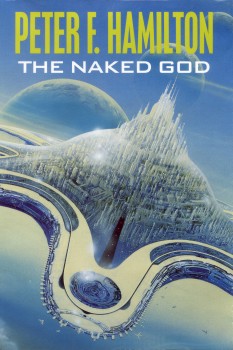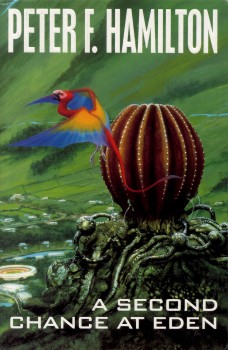The Naked God:
(3rd novel in the Night's Dawn trilogy)
![]()
![]()
![]()
Click here to read the book's blurb
Click here to see the ultra-huge scan of the entire hardback book cover
Click here for the spoiler laden sections of the review. Read this is you've either:
a) Read the book already
or
b) Like having things spoiled for you
Click here to read the log of an IRC chat with PFH after he released The Naked God
 |
The Naked God is possibly the one novel that I have read continuously for about 12 hours. It's that kind of novel.
However, unlike the enduring classics, every time I think about the book, it seems a little less special. You get the feeling that Hamilton was desperately trying to finish off the novel as quick as he could (I believe that he himself said that by the end of The Naked God, he was fed up with the trilogy. It's not the same thing, but still).
There's none of the 'newness' you get in the two previous novels. Rather than being a novel in its own right, the Naked God is dragged down by the previous events in Reality Dysfunction and Neutronium Alchemist. The 1200 pages count for nothing when you can see Hamilton frantically trying to wrap every single plot thread up in time for the end. Take, for example, the Joshua and Louise saga. You know perfectly well that they're going to get back together in the end (and if you didn't, well, now you know). And you think - hmm, how is Hamilton going to work that one out when he's still going out with Ione.
I was disappointed with the way Hamilton handled it. Ione abruptly breaks up with Joshua (albeit amicably, of course), and you're just *waiting* for when Joshua confesses his dying love of Louise. Which, surprise surprise, he does shortly afterwards.
Rushing too fast isn't Hamilton's only sin. Stretching things out is another. Which is pretty weird, as these things go. The whole sections where the possessed are trying to cope with life in the universes they transported themselves to through the red mist are overlong and pretty boring. Ditto for the Valisk section.
Also, there's the Mortonridge Liberation. Aside from the good bits featuring Sinon, the whole Liberation is a bit of an anticlimax. You feel cheated when you finally read about how it was resolved, especially when there was such an intense build-up to it during the second half of the Neutronium Alchemist.
I do have to mention that some sections of the book were very good, including the Earth sections, and other battle scenes.
Perhaps if Hamilton didn't spend so much time on the stretched out possessed sections, and instead used them for character development and the Joshua-Ione-Louise situation, the novel might have much better.
I am being very hard on the Naked God. I've only concentrated on the worse sections, but I can't help this because I've expected so much from the it - I expected that it would be as good, if not better, than the two previous novels in the trilogy. It still, for the most part, keeps the action going. There's still the cutting humour and wicked wit which you'll see from some new characters.
The Naked God is still a good book. You should definitely buy it if you've read the last two novels. But compared to the excellence of Reality Dysfunction and Neutronium Alchemist, you can't help but feel disappointed.
PS: Please check out all the commentary that's linked to on the left hand margin of this review. There's a lot of good material to be read (but remember the warning about spoilers!)
